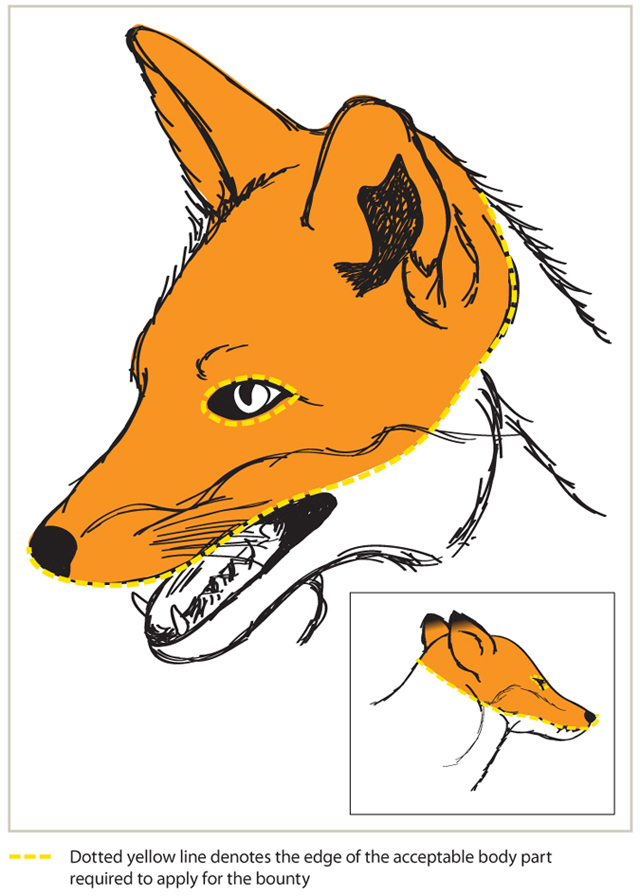Acceptable fox body parts
Bounty program update
The Victorian Fox Bounty will resume on Monday 3 March 2025 with collections starting in the south-west of the state. The reward for fox scalps will increase from $10 to $14.
Participants are encouraged to set up an online account to streamline the application process and ensure prompt electronic payment. Payment by cheque is no longer available.
Participants are reminded that the wild dog component of the bounty has ended. As a result, wild dog body parts will no longer be accepted at collection centres.
The Victorian Fox Bounty is funded to continue until 30 June 2025.
Please continue to visit this website for updates. For further information please call 136 186 or email bounty.applications@agriculture.vic.gov.au
Foxes

Eligible applicants must submit the ‘entire’ fox scalp including both ears, the skin surrounding both eyes and the nose. Individual entire fox scalps can be air dried, frozen or fresh.
Entire fox scalps submitted in batches must be separated into individual scalps for identification and counting.
No blocks of frozen entire fox scalps will be accepted. Frozen material must be thawed prior to being submitted. No putrefying material will be accepted.
Only entire fox scalp including both ears, the skin surrounding both eyes and the nose will be accepted.
Agriculture Victoria bounty collection staff reserve the right to reject material submitted for bounty reward if they deem the submitted material does not meet section 4 of the terms and conditions.
The decisions made by Agriculture Victoria bounty collection staff to either accept or reject entire fox scalps for bounty reward are final and non-negotiable.
How to create an entire fox scalp
- After confirming the animal is dead, use a sharp knife to make an incision across the back of the skull behind the ears.
- Drawing the skin forward from the back of the skull, around the eyes to the tip of the nose, continue to separate the skin from the skull.
- The final entire fox scalp must be intact and include both ears, the skin surrounding both eyes and the nose.
Why this body part was chosen
This body part has been chosen to enable our staff to confirm it belongs to a fox and that its from a single animal. The body part selected purposefully differs from previous bounties to reduce the incidence of stockpiling outside of the current bounty collection period.
Requirements for carcass disposal
The Victorian Fox Bounty plays an important role in helping farmers protect their livestock from major predators and we expect everyone participating in the program to act responsibly when disposing of carcasses.
Hunters should determine how carcasses will be disposed of prior to harvesting – whether that is the farm or collection sites on which it was taken, as long as the burial site does not adversely impact cultural heritage, land, surface waters, ground waters or air (odour).
The dumping of fox carcasses affects the integrity of the bounty program and reflects poorly on hunters – furthermore, it is a breach of the terms and conditions. Where breaches of the terms and conditions are detected, Agriculture Victoria reserves the right to reject applications.
Where fox carcases (waste) present in a manner to indicate they were harvested as part of the Victorian Fox Bounty Program, Agriculture Victoria should be contacted on 136 186. Agriculture Victoria will make all reasonable attempts to investigate the matter and identify the waste dumper or polluter.
Enforcement
The Environment Protection Authority Victoria (EPA) is the agency responsible for investigating offences under the Environment Protection Act 2017. EPA Victoria is responsible for enforcing relevant laws where rubbish dumping creates significant pollution or environmental impacts.
Reports of illegal rubbish dumping, including animal carcasses, can be made to EPA Victoria on 1300 372 842 or visit EPA.
Hygiene precautions
People should be aware that foxes can carry the hydatids and a range of other parasites that are transferable to humans.
Persons handling foxes or their body parts should observe appropriate hygiene standards.
Community members presenting body parts for the bounty are encouraged to adopt appropriate hygiene practices. These include:
- wearing disposable gloves
- washing hands with soap and warm water
- using disinfectant before eating, drinking, smoking and going to the toilet.
Additionally, clothes should also be washed thoroughly after any contact with carcasses.
Further information
For further information contact our Customer Service Centre on 136 186.
